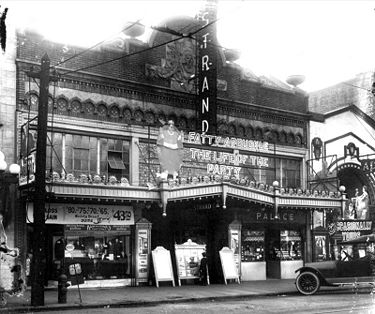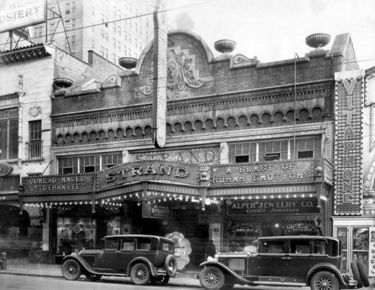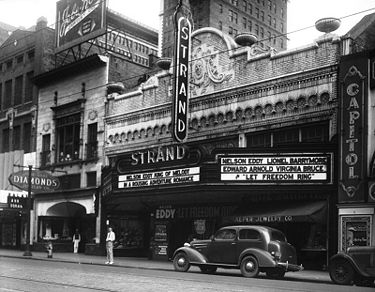Strand Theater
The Strand Theater (briefly called the Newmar Theater) was an 800-seat movie theater located at 1913-15 2nd Avenue North. It was constructed in 1915 on the site of the former Steele-Smith Dry Goods Company store, which had been destroyed by fire a year before.
The theater, which opened on September 30, 1915, was operated by S. A. Lynch Enterprises of Asheville, North Carolina, one of the first large cinema chains, and a regional distributor for W. W. Hodkinson's Paramount Pictures. The brick facade featured a central bas-relief and prominent urns on its parapet. Below a frieze of projecting arches was a mosaic tile panel with the name of the theater, flanked by windows. On the ground floor the central recessed entrance had retail tenants to either side.
The Strand survived the break-up of the Triangle Film Corporation, in which Lynch had become a partner. Equipped with a Pitcher theater organ, it prospered as Birmingham's finest silent movie house as Lynch solidified his distribution empire under the Southern Enterprises banner before selling out to Paramount in 1922. Several silent film stars, including Francis X. Bushman, Douglas McClean and Walter Hiers, made appearances at the theater. A stage was hastily constructed for an in-person appearance by Clara Kimball Young. The 1926 feature Men of Steel, filmed in Ensley, showed at the Strand following its world premiere at the Franklin Theatre. The Strand also hosted a revival of D. W. Griffith's The Birth of a Nation.
Richard Kennedy became manager in 1920 and later oversaw the introduction of "talkies". The first of those, The Jazz Singer with Al Jolson, had its Birmingham premiere at the Strand on May 4, 1928 and ran for 13 weeks. The late 1927 opening of the much larger and more sumptuous Alabama Theatre cost the Strand its pre-eminence as Paramount's first-run screen. Meanwhile, the Great Depression cut deeply into returns and the combined chain filed for bankruptcy in 1935. The Strand's best run in the two-year period beginning in October 1934 was "In Old Kentucky", which took in $4,250 in its 1 1/2 weeks.
In 1948 Newman Waters converted a neighboring theater, the Capitol into a second-run theater call the "Newmar". When it closed a few years later, the Strand took over the name. The Newmar name was removed and the Strand reopened as part of the Acme Theater chain in September 1959 with a first-run showing of Walt Disney's Darby O'Gill and the Little People.
The theater, then managed by Henry Hury, closed on November 28, 1962 after a showing of Roger Corman's Tower of London starring Vincent Price. The building was purchased by Birmingham Trust National Bank, which demolished it in August 1963 to make room for a new parking deck for its 20th Street office.
References
- Weaver, Emmett (November 29, 1962) "Victim Of Progress— Strand Theater Ends Nearly 50-Year 'Run'" The Birmingham News - via Birmingham Rewound
- "Showplaces of the South, Part 3" (July 3, 2006) Birmingham Rewound


